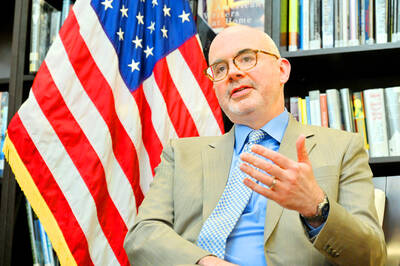Far-right firebrand Geert Wilders faced an uphill struggle yesterday to woo rivals for a coalition government after a “monster victory” in Dutch elections that shook the Netherlands and Europe.
His Freedom Party (PVV) won 37 seats in the Dutch parliament, more than doubling his share from the last election and outstripping opponents, according to near complete results.
A left-wing bloc trailed far behind on 25 seats, with the center-right People’s Party for Freedom and Democracy (VVD) on 24, a catastrophic result for the party of outgoing Dutch Prime Minister Mark Rutte.

Photo: AFP
Wilders, 60, now has the daunting task of trying to form a working coalition, courting rivals that categorically ruled out serving in a PVV-led government.
The unexpected landslide win prompted immediate congratulations from fellow far-right leaders in France and Hungary but would likely raise fears in Brussels — Wilders is anti-EU and wants a vote on a “Nexit” to leave the bloc.
Although he softened his anti-Islam rhetoric during the campaign, the PVV program pledges a ban on the Koran, mosques and Islamic headscarves. As a result, Muslim community leaders in the Netherlands voiced concern.
“I woke up this morning with an unpleasant feeling. Actually also in shock,” said Habib el-Kaddouri from the SMN association of Moroccan Dutch.
“Some people are scared, others uncertain about their future, about what the result means for their citizenship or place in Dutch society,” he added.
Lizette Keyzer, a 60-year-old business manager from Enschede, said she had “heart palpitations” when the exit poll results came out.
The country “is going in a right-wing direction. We hope that this does not completely become the case,” Keyzer added.
Addressing cheering supporters in The Hague after exit polls, Wilders doubled down on his anti-immigrant rhetoric, saying the Dutch had voted to stem the “tsunami” of asylum-seekers.
He later told reporters he wanted to be “prime minister for all Dutch” and would “work hard with other parties” to form a coalition.
However, it is not clear how he can scrape together the 76 seats he needs for a majority in the 150-seat parliament.
Former European commissioner Frans Timmermans, whose Green/Labor bloc came in second, immediately ruled out cooperation, saying it was now their job to “defend democracy” in the country.
Anti-corruption champion Pieter Omtzigt, whose New Social Contract party scored 20 seats, indicated he was “available” for talks, admitting they would not be easy.
Dilan Yesilgoz, who led the centre-right VVD to a disappointing 24 seats, was coy on election night, saying Wilders would have to see if he can forge a coalition.
She first opened the door to Wilders joining a VVD-led government but has stressed she would not serve under him.
“It will be entirely up to the VVD,” said Sarah de Lange, professor of political pluralism at the University of Amsterdam. “A big issue will be who will be prime minister, because with Wilders as prime minister, the Netherlands has an impossible situation internationally.”

NATIONAL SECURITY: The Chinese influencer shared multiple videos on social media in which she claimed Taiwan is a part of China and supported its annexation Freedom of speech does not allow comments by Chinese residents in Taiwan that compromise national security or social stability, the nation’s top officials said yesterday, after the National Immigration Agency (NIA) revoked the residency permit of a Chinese influencer who published videos advocating China annexing Taiwan by force. Taiwan welcomes all foreigners to settle here and make families so long as they “love the land and people of Taiwan,” Premier Cho Jung-tai (卓榮泰) told lawmakers during a plenary session at the Legislative Yuan in Taipei. The public power of the government must be asserted when necessary and the Ministry of

Proposed amendments would forbid the use of all personal electronic devices during school hours in high schools and below, starting from the next school year in August, the Ministry of Education said on Monday. The Regulations on the Use of Mobile Devices at Educational Facilities up to High Schools (高級中等以下學校校園行動載具使用原則) state that mobile devices — defined as mobile phones, laptops, tablets, smartwatches or other wearables — should be turned off at school. The changes would stipulate that use of such devices during class is forbidden, and the devices should be handed to a teacher or the school for safekeeping. The amendments also say

CONSISTENT COMMITMENT: The American Institute in Taiwan director said that the US would expand investment and trade relationships to make both nations more prosperous The US would not abandon its commitment to Taiwan, and would make Taiwan safer, stronger and more prosperous, American Institute in Taiwan Director Raymond Greene said. “The US’ commitment to Taiwan has been consistent over many administrations and over many years, and we will not abandon our commitment to Taiwan, including our opposition to any attempt to use force or coercion to change Taiwan’s status,” he said in an exclusive interview with the Liberty Times (the sister newspaper of the Taipei Times) on Friday last week, which was published in the Chinese-language newspaper yesterday. The US would double down on its efforts

SECURITY: President William Lai has announced plans to restore the military court system that was disbanded in 2013 to address a surge in Chinese infiltration efforts Taiwan plans to reinstate military judges to hear Chinese espionage cases and other offenses involving Taiwanese service members, President William Lai (賴清德) said yesterday. There would be a review and legal amendments “to reinstate the military trial system,” he told reporters after a national security meeting. “Military judges will return to the front line,” Lai said. Military judges would work “alongside prosecutorial and judicial agencies to handle criminal cases involving active-duty military personnel accused of treason, aiding the enemy, leaking classified information, dereliction of duty, insubordination and other military offenses,” he said. The number of people prosecuted for spying for Beijing has risen sharply,